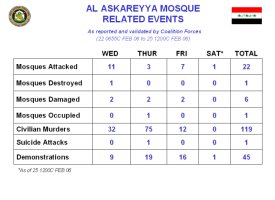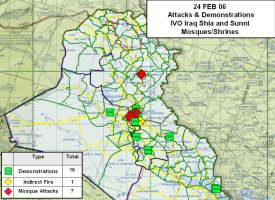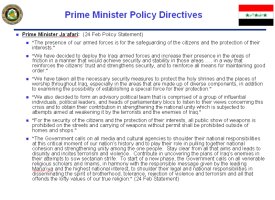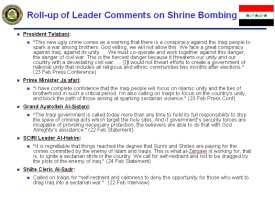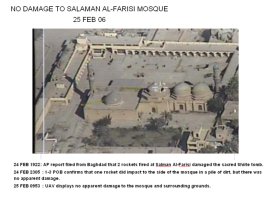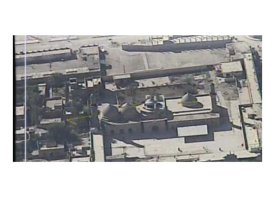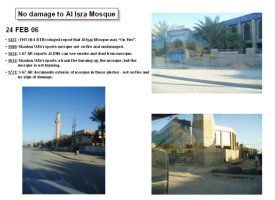
OPERATIONAL UPDATE BY ARMY MAJOR GENERAL RICK LYNCH, DEPUTY CHIEF OF STAFF, MULTINATIONAL FORCE
Multi-National Force-Iraq
OPERATIONAL UPDATE BY ARMY MAJOR GENERAL RICK LYNCH, DEPUTY CHIEF OF STAFF, MULTINATIONAL FORCE IRAQ LOCATION: THE COMBINED PRESS INFORMATION CENTER, BAGHDAD, IRAQ DATE: SATURDAY, FEBRUARY 25, 2006
GEN. LYNCH: I appreciate you coming in today. I know we just did this a couple of days ago, but I thought it would be important that I give you some fidelity on what we see happening across Iraq as a result of the heinous terrorist attack that took place on Wednesday against one of Iraq's holiest shrines. Remember, what the terrorist was trying to do with that attack was to incite sectarian violence. He was continuing to try to derail the democratic process and discredit the Iraqi government. And that's why that attack took place.
But over the last three days what we've seen is not widespread sectarian violence. And I'm going to walk you through the details of that. And we believe that there has not been widespread sectarian violence because of a capable Iraqi government, because of calls by leaders of Iraq, religious and political leaders, for calm; and because of the capable Iraqi security force and coalition forces conducting security missions across Iraq. Let me be clear, there have been pockets of violence, but we don't see that as a precursor to civil war. Allow me to provide some details.
First chart, please.
As I said on Thursday, this is indeed a difficult time. It's a confusing time. And there are a variety of reports out there about acts of violence. And what we've been doing as the coalition, with the Iraqi security forces, is working through those reports to get some fidelity as to exactly what has taken place. So as of noon today, this is what we've seen across Iraq:
We've seen 22 mosques attacked. The reports that came out of the (INJNT ?) reflected 51 attacks. And what we have been doing over the last three days is moving to confirm or deny those reports, actually sending soldiers, actually sending equipment, unmanned aerial vehicles, to look at those mosques to determine whether or not there's been any damage. And as a result of that, we've only seen 22 mosques that have been attacked. Of those 22 attacks, we've only seen six with significant damage. Again, if you do a tabulation of all the reports, there were reports of 23 mosques having significant damage, and that's not what we've seen.
And allow me to show you a couple of examples.
Picture, please.
This is Salman Al-Farisi Mosque. And there was a report that on the night of the 24th this mosque had been attacked and severely damaged. So as I said, we sent soldiers -- Iraqi security force soldiers and coalition soldiers -- to the site to determine how much damage there was, if any. And we've used our own assets to see whether or not we see any damage.
There was, clearly, an attack at the mosque because members of the 1st Battalion of the 3rd Public Order Brigade found that a rocket had been fired, but impacted to the side of the mosque, but there was no damage. And as we used our unmanned aerial vehicles to fly over the mosque, we see no damage here on this side or -- next picture, please -- on the other side.
As the coalition forces did their investigation, they found that there was a terrorist attack of a hotel about half a kilometer from the mosque, but we don't believe those two events to have been related.
So I talked about six mosques with severe damage. But every report that we've had across Iraq we've worked to confirm or deny. And this is an example of one we moved to, and as a result of our reconnaissance, saw no damage.
Next picture, please.
And this is another one, a mosque in south Baghdad. There was a report that the mosque was on fire. And this was indeed widely reported. And as we sent our UAV there, you could see flames and smoke. When we got to the level of detail we needed to determine the level of damage, we found that the flames and smoke were coming from a trash fire by the mosque, but the mosque itself was not at all damaged and was clearly not burning. So you see no damage to that mosque.
So 22 mosques attacked, we've seen since Wednesday, and six mosques that have been significantly destroyed. And the mosque in Samarra is the mosque that was indeed destroyed.
We have seen pockets of violence. And one of the increases that we've seen is the numbers of murders, civilian murders. Even though there were reports of over 200 murders, all we can confirm is 119. Now, that's an increase. In general terms, what we've seen recently in Iraq are murders on the average of 10 a day. And, clearly, that is an increase in terms of numbers of murders, so we're watching that very closely. So there are indeed pockets of violence as a result of the attack the Golden Mosque in Samarra, but nearly as widespread that has been reported.
So let's think about that. We believe that the attack on the Golden Mosque was conducted by terrorists to create and inflame sectarian violence. And that did indeed happen. The mosque attack occurred. As a result of that, we've seen some increase in violence. Another tool on the part of the terrorists is to inflame the reports -- talk about more attacks, talk about more detailed damage, talk about more murders. And that gets picked up to the Iraqi people and they believe that the violence is much more widespread than it truly was.
We're seeing pockets of violence that we can trace readily to the attack on Wednesday, but we're not seeing a precursor to civil war. And let me tell you why we think that is.
Next graphic, please.
Let me make one other point -- I'm sorry. We'll just say we practiced changing that graphic.
I don't want to lose the point on demonstrations. We've seen 45 demonstrations across Iraq, 32 inside of Baghdad. Of those 32 demonstrations inside of Baghdad, only one was violent. The other 31 were peaceful demonstrations, where the people of Iraq -- Shi'a and Sunni and Kurd -- came out to the streets to demonstrate against the terrorist act of the attack on the Golden Mosque. That's what you would expect in a free society -- demonstrations -- public demonstrations, and that's what we saw, 45 across Iraq, 32 in Baghdad, of which only one in Baghdad turned violent.
And now the next chart, please.
I said the reason that we have not seen sectarian violence swell to a precursor civil war is three reasons.
One is a competent, capable Iraqi government. And from the beginning, the prime minister and his cabinet came forth with a call for national unity, came forth with a call for calm, blasted the atrocity and asked for calm. And the prime minister, in a statement yesterday talked through these things, all of which are clearly very important, and all of which, we believe, have led to the situation we see today, which is some violence, but not significantly increased violence. He called to reinforce the role of the armed forces for the safeguarding of the citizens and the protections of their interest.
We are not seeing rifts established inside the Iraqi security force. We are not seeing members of the Iraqi army -- Sunni versus Shi'a -- fighting amongst themselves. We're seeing a nationalist security force doing their mission -- safeguarding the citizens and protecting their interest.
The prime minister and the leadership of Iraq said we need to get the armed forces on the street because we know the terrorists will try to inflame sectarian violence, and we need to stop that. So he ordered his forces deployed and increased their presence in the areas of friction, and that's what we saw. He canceled all leave, so the Iraqi security forces -- he called them all back on duty and placed them across Iraq, where they needed to be, to be able to protect critical areas, specifically in areas of friction.
Now the Iraqi security forces did not do that on their own. They did that in conjunction with the coalition forces. As we talked about on Thursday, we didn't change our uptempo. We didn't change the way we conduct missions, and we're continuing to do that with our Iraqi security force brethren to maintain a safe and secure environment here in Iraq.
The prime minister announced implementation of extra security measures to protect the holy shrines and the places of worship, especially in those areas that are made up of the diverse components. And you saw that here in Baghdad, in Salahuddin, in Diyala and in Babil with the announcement and enforcement of a curfew.
The prime minister has indeed formed an advisory political team, made up from members from all sects that will do just as described -- talk about what happened, what can we learn from this event and how can we move forward on an axis of national unity. He prohibited the public show of weapons on the streets, and he called for responsible agencies to adopt an Iraqi nationalist approach.
Shouldering national responsibilities at this critical moment play their role in pulling together national cohesion and strengthening unity and contributing and undercovering the plans of Iraq's enemies. Iraq's enemies are the terrorists who want to derail the democratic process and discredit the Iraqi government, and he's calling for a unified front from the media, from cultural agencies, and he's calling for religious scholars and imams to shoulder their legal and national responsibilities in disseminating the spirit of brotherhood, tolerance, rejection of violence and terrorism and all that offends the lofty values of our true religion.
Prime -- the prime minister exhibited extremely strong leadership from the point of the crisis with the attack on the Golden Mosque and continues to demonstrate that leadership, and his ministers, specifically the security ministers, have taken this up and have worked to ensure there's a safe environment across Iraq.
Next graphic, please.
In addition to that, we're seeing other leaders, religious leaders, political party leaders, calling for calm. The president made an announcement. He says we face a great conspiracy against Iraq, against its unity. We must cooperate and work together against this danger, the danger of civil war. No one denies, the Iraqi leadership doesn't deny, the coalition leadership does not the deny, the Iraqi security force leadership does not deny that there is a potential for civil war, that there is indeed an enemy that wants to flame sectarian violence and drive a wedge between the factions here in Iraq. And the president has identified that and has called for unity to fight that danger.
We talked about this on Thursday. The Grand Ayatollah al-Sistani issued fatwas calling for calm, to stop the spike of criminal attacks which target the holy sites. The security leader, al-Hakim, just yesterday came forward and said this is what al-Zarqawi is working for, that is to ignite a sectarian strife in the country. We call for self-restraint and not to be dragged by the plots of the enemies of Iraq. And Shiite Cleric Sadr has called for restraint and calmness to deny the opportunity for those who want to drag Iraq into a sectarian war.
So we saw confident, capable leadership of the Iraqi government, and we've seen religious and political leaders across the sects calling for calm. And as a result of that, we're seeing the type of attacks that I described earlier.
So go back to the first graphic, please.
We're seeing reports that we don't understand. We're seeing reports in the media -- the Western media, the Arabic media -- that identify attacks on over 100 mosques, and we can't see it. We've seen attacks on 22. Those reports that we've received about potential attacks on mosques, we've moved to -- to confirm or deny the attack, and we can't see it. Just in Baghdad, 25 different events yesterday where the folks in Baghdad -- the members of the 4th Infantry Division and the Iraqi security forces inside of Baghdad -- moved to reported attacks on mosques and found nothing when they got there. There has indeed been, unfortunately, mosque damage, but only six, which is different than the inflamed report of 23 and the much bigger number that we're seeing in the press.
And indicated that we are concerned about is the number of murders. On Thursday, when I talked to you on Thursday, there were indeed 46 Iraqi civilians in the vicinity of Baqubah that were found murdered in a ditch. Our averages tell us that we should see about 10 a day, and we're seeing more than that; clearly saw more than that on the day after the attacks. But the numbers of attacks and the numbers of civilian murders are moving back down towards the trend that we've seen in the past. So we're seeing pockets of violence, but we're not seeing civil war.
And with that, I'm happy to answer your questions.
Please.
Q General -- (name inaudible) -- with AFP Wire Service.
GEN. LYNCH: Hi.
Q A couple of things.
First of all, can you tell us a little bit more about the role of U.S. forces in providing extra security at the moment? And secondly, in your view, why did one need two days of curfew and now an extra day of a traffic ban to deal with this?
GEN. LYNCH: Okay, I'll work the first question here first.
In this time of tension, increased presence of security forces were important to the people of Iraq. So a conscious decision was made by the Iraqi government to recall the members of the Iraqi security and increase their presence on the streets in Iraq.
General Casey, in conjunction with the prime minister and the leaders of the Iraqi security force, decided to at the same time increase the presence of our coalition forces in their respective area of operations.
So for example, just yesterday there were 268 patrols, coalition and Iraqi security force patrols, inside of Baghdad. There were 136 checkpoints established, manned and occupied, in addition to the normal enduring checkpoints. So the coalition forces have indeed stepped forward with our Iraqi security force brethren to reinforce the security and to be a more prominent presence across Iraq, which we found to be very important.
But the Iraqi security forces continue to have the lead in their respective areas. They, directed by their government, moved to secure critical sites -- mosques, shrines, political headquarters buildings -- and they've done that very well.
Now to your second question:
What we've seen we worked our way through the significant events over the last year, the January elections, the October referendum and the December elections, is that curfews and bans from carrying weapons and vehicular movement bans enhance the security during particularly tense times. And the prime minister made a decision to do that.
And he also made a decision to extend the curfew and, as you say, the vehicle ban. He did that based on advice from his senior leaders, from his security ministers and his leaders of the Iraqi security force. And he has done that with good effect.
Kimberly? Q Kimberly Dozier with CBS News. The figure that we got -- you discussed not trusting first reports on Thursday.
GEN. LYNCH: Yeah.
Q The figure that we got of a hundred mosques was coming from the Ministry of Interior and also from the Muslim Scholars Association. My first question would be, how do you account for the great discrepancy between what you guys have found and what they believe to be the case?
And then the second thing is, you know the terrorist dictum "Kill one, frighten a thousand." Even if there are only pockets of violence, there seem to be large numbers of very scared people out there. How do you win them over and calm them down?
GEN. LYNCH: And you know me, Kimberly; I'm going to have to answer your first question, and you're probably going to have to repeat the second question. But I'll try to remember.
There are reporting chains across Iraq. There is a coalition reporting chain. There is an Iraqi security force reporting chain. There's national tip lines. There are chains of communication between political leaders. And they all end up in the NJOC, the National Joint Operations Center.
If you think like the enemy, the enemy wants to continue to inflame the violence. And he says, "Okay, we did good at the golden mosque in Samarra, and look at the effect. So let's try to exponentially increase the impact of that by submitting false reports."
So what we believe is, there are people out there that are generating reports that are false. And as a result of that, their problems look much, much more worse than they truly are on the ground. You take them all the way through the different reporting chains. You get that information at the NJOC. The coalition forces and the Iraqi security forces work together to analyze that data. We actually use resources to confirm or deny.
Let's fly this unmanned aerial vehicle over that mosque and determine whether or not there's a mosque on fire. Let's tell the Iraqi security forces, the public order battalions, to move to that mosque and determine whether or not there was an attack. And then you get fidelity on the situation.
And what I'm trying to show you today, Kimberly, is what we believe is what's happened in Iraq since the attack on Wednesday.
And you're going to have to repeat the second question. Q The second question is, there are a lot of scared people out there who believe these pockets are much worse, much more widespread. How do you calm them down? And how do you convince them not to join in just because they feel threatened?
GEN. LYNCH: Okay. It's all about -- in Iraq it's all about perceptions of security. And the people of Iraq, as they're sitting in their homes, remember -- I think the number is over 90 percent -- of the homes in Iraq have access to television.
So as they're sitting in their homes and they're watching TV and they're seeing hundreds of mosques being attacked, and they're seeing violence in the street, and they're seeing indications of increased civilian murders, they are indeed scared. They are indeed scared. So to keep them from being scared, you got to do two things. One is, you got to have fidelity in reporting. If the Arabic media first puts out an incorrect report, and over time it looks like, no, that mosque really wasn't damaged, or that number of murders didn't happen, then that report ought to be corrected so the people in their homes in Iraq can say, "Okay, I'm not as scared as I was."
And the other thing that's got to happen is what we're seeing happen. We're seeing the leaders in Iraq -- the political leaders, the tribal leaders, the religious leaders -- calling for calm and talking to their people and saying, "Let's calm down. It's not as bad as it looks. Let's calm down."
So we are concerned about perceptions of insecurity. What I'm trying to explain to you all is this is what we're seeing across Iraq. We are indeed seeing a return to normalcy in terms of attacks against civilians, attacks against mosques. But remember, in Iraq there's always a baseline level of violence. I talk to you every Thursday about the number of attacks across Iraq, and I've talked to you the last couple of Thursdays about the increase we're seeing on attacks against civilians and the increase we're seeing on attacks against Iraqi security forces. And that is indeed going to continue.
Please.
Q Thank you. Larry Kaplow with Cox Newspapers.
GEN. LYNCH: Hey, Larry.
Q I just wanted to clarify on the way you verify these reports. Are you having U.S. soldiers go to each mosque where there's a report of damage, or is it a combination of Iraqi and U.S. soldiers, or is it a combination of UAVs also? In other words, do some of them just have a UAV check it out?
And secondly, are you including what we've heard about some mosques that have maybe not been damaged, but have been taken over, like the Neda Mosque on Cairo Street, which is a big one that I don't know if it was damaged, but supposedly strangers have taken the place over. GEN. LYNCH: We've got a corps commander, operational commander, and he's got respective division commanders across Iraq, and those division commanders control both Iraqi security forces and coalition forces. And to confirm or deny a reported attack, the division commander has a choice as to what should I send. And in some cases he sent coalition forces. In some cases he sent Iraqi security forces. In some cases a combination thereof. Remember, the Iraqi security forces that are working in operations across Iraq, the majority of them have embedded U.S. and coalition military, these Military Transition Teams. So even if it was a Iraqi security force unit that moved to determine it, there was still coalition force presence. Or he could say let's check this out by electronic means; let's move a UAV to go look at it. But only when that tactical commander is convinced he's got an accurate report does he stop searching that out.
So what I tried to show you was a couple of examples of what has happened. But in Baghdad, just yesterday, that happened 25 times. And General Thurman, the tactical commander, said, "I'm going to send troops, I'm going to send a UAV, and I'm going to confirm or deny that that mosque was attacked."
So what I'm telling you, Larry, is over the three days, this is what we think has happened, that there have been 22 mosques attacked and there have been six mosques with significant damage, and we can confirm that.
As reports come in -- and they continue to come in -- we'll chase down those reports as well.
And your second question?
Q About mosques that have been invaded and taken over, even though it might not have damage that you can see with a UAV or even driving by it.
GEN. LYNCH: Yeah, I participated today with a operational update with the corps commander and his division commanders, and there was not a single report of a mosque that had been occupied by other forces. So I can't comment on that because I don't have that information.
If indeed there was a mosque that was occupied by people that shouldn't be there, we'd be working with the Iraqi government and Iraqi security forces to regain control of that mosque.
Sir?
Q Charlie Handly (sp) of the AP.
GEN. LYNCH: Hey, Charlie. Q General, when you start getting into numbers, it brings up all sorts of questions, of course. First of all, a simple one. You said 268 patrols, Iraqi and coalition force patrols in Baghdad. Over what period? And compared -- what's the comparison? What's the average?
But then I have another numbers question, if I may.
GEN. LYNCH: Okay. I can answer part of that. The number I gave you was the patrols in Baghdad in the last 24 hours -- 268 patrols. Now, how that compared to the day before, we'll have to chase that information down.
Q Or before the trouble.
GEN. LYNCH: Yeah. Or before the trouble.
I don't know. I do know what General Casey has directed and the leaders of the Iraqi security forces has directed is increased presence in those areas across Iraq where the terrorists might be planning additional acts of violence.
So the 268 number is probably an increase. I'll get you the exact increase.
Q Appreciate it. Mosques damaged is on the chart as six, but then you refer to them as significantly damaged. Do you have a figure for mosques that have been damaged?
GEN. LYNCH: There was across Iraq certain instances where mosques were fired at by vehicles that moved by, by small arms fire, so maybe there was an AK-47 and three rounds and it went and impacted on a mosque, but it wasn't at all significant damage, and I can't recall right now the numbers of times that happened. But when you go to the mosque at the end of the incident, the damage is irrelevant.
Q But then you're comparing it to 23 mosques damaged, and, frankly, I don't know where that reports comes from, but you're talking about press reports, et cetera --
GEN. LYNCH: That was the (ENJOC ?) report of the mosques damaged.
Q -- so we may have some -- oh, the (ENJOC ?) report was 23 mosques damaged?
GEN. LYNCH: Yeah. Right.
Q All right. And my final -- my final number's question is that -- just to follow on Larry's, are there not press reports that have not been checked out, for example, just mosques damaged? Have you checked out every press report?
And secondly, are there undoubtedly mosques that have been damaged that have not been reported as being damaged at all by anybody?
GEN. LYNCH: I am absolutely positively assured that we have not checked out every report, because you got commanders out there -- tactical commanders, division commanders, brigade commanders, battalion commanders, Iraqi security force and coalition -- that are kind of busy securing the streets of Iraq. In addition to that, they need to move and confirm or deny this report of this attack on the mosque. So I'm sure that there are indeed instances of reported attacks that we haven't move to confirm or deny.
But I do know that in Baghdad just yesterday, General Thurman had to do that on 25 different times, and 24 of those times there was no damage to the mosque.
Please.
Q (Name inaudible) -- with The Washington Post.
GEN. LYNCH: Hi.
Q General, you flashed by on one of those cards a quote from Muqtada al-Sadr, the Shi'ite cleric. In that quote, of course, he was appealing for calm and self-restraint; yet his militia, the Madhi Army, has been seen on the streets of Baghdad, especially in Sadr City, of course, and blame for a lot of these attacks. What are -- what is the coalition and Iraqi security forces doing to rein in these militias?
GEN. LYNCH: That was an excellent question, and it was excellent question when you asked me it on Thursday. The government of Iraq has decided that they won't accept militias on the street, and in the CPA orders and the TAL and in the constitution, militias have been outlawed. The government of Iraq has identified that the Madhi militia is out there, but should not be out there. And I know that the government of Iraq is working to disband that militia and for sure during this time of crisis to keep the militia under control.
So no one is denying the presence of the Madhi militia, but we are working with the Iraqi government, the Iraqi authorities to ensure they're doing what they should be doing and not untoward activities.
Please.
Q Thomas Lasseter, Knight Ridder. I had a couple of questions. The first is --
GEN. LYNCH: Do one at a time, please.
Q One at a time.
GEN. LYNCH: Thanks.
Q The first is a follow-up about the Madhi Army and other militias. You know, there has been for the past two years sort of this ongoing desire for the militias not to exist, you know, the Madhi militia in particular is a good example, where, you know, where U.S. forces were fighting it in April of 2004. You know, they were out there with RPGs and AK-47s a couple days ago. You know, can these militias be controlled? And what are the security implications of those militias still existing right now, because when you speak with Iraqis on the streets, that's what they're most concerned about right now, is back and forth militia violence, you know, getting the neighborhood-level folks involved and moving beyond the ability of their leaders to control the violence.
GEN. LYNCH: Yeah, we -- Tom, we are absolutely convinced that the Iraqi government is at a time of opportunity here. Remember, after the elections in December, the call was for a national unity government. And what's happening now is the terrorists are trying to drive a wedge between the ethnic and sectarian groups here inside of Iraq. So this call for a national unity government is still very important.
We also are absolutely convinced that the government of Iraq has an opportunity now to get rid of the militias. They've said all along that these militias are not acceptable. And we do know that the Iraqi authorities have identified that the Mahdi militia is still active and is doing things that it should not be doing. So we see the government of Iraq seizing this opportunity to use this opportunity to disband -- work to disband these militias. But nothing is easy. You know as well as we do that nothing is easy. But that is indeed the state of intent.
Q So how does one disband these militias? How does that happen?
GEN. LYNCH: Remember, there is an entire process already established here in Iraq for the transition and reintegration of things like militias. And you call for the militia, you approach the leader of the militia and say we need your folks to lay down their weapons. Remember, one of the things that the prime minister called for is no public display of weapons. So you call for them to lay down their weapons. You call for them to join the Iraqi security forces, and after an appropriate vetting process, they are members of the Iraqi security forces. And those that don't join the Iraqi security forces simply go back home; keep their weapons out of their hands and go back home.
That is the stated intent. That is the process. If it were easy, it would have already been done.
Q At what point does the Iraqi government's continued call for the militias to disband, and the militias not disbanding, at what point does that begin to undermine the Iraqi government's legitimacy in the eyes of Iraqis? And again, sort of just to contemplate the implications for that for, you know, a guy in a neighborhood, you know, there's violence down the street; instead of them trusting their government to ensure security, they pick up a gun also and there's fighting and, you know, what follows. GEN. LYNCH: The Iraqi government has an opportunity, and now is the opportunity to exhibit leadership. And that's what we're seeing as a result of the attack on the mosque in Samarra on Wednesday; we're seeing Iraqi leaders calling for people to unite against the terrorists -- we're seeing that. Now is also the time for the Iraqi leadership to take a strong stance against militias, and when they see armed militias and believe they're not right for the people of Iraq, they're not supporting the Iraqi security force, the nationalist government, then they need to be disbanded. And they have to continue to discourage anybody taking up weapons. We need the people of Iraq to believe in their own security forces. Remember, part of the end state is a security force that can maintain domestic order. That's what the people of Iraq have to believe in, and that's what the government of Iraq has to endorse.
Okay, Kimberly, please. Ladies first.
Q Just a very quick follow to that. The Mahdi Army, yesterday in Sadr City, patrolled for hours. Do you think that perhaps the Iraqi government has decided that at this tense time it's a good relief valve to let them show force and make Shi'ites feel protected in that particular neighborhood?
GEN. LYNCH: We're not seeing the Iraqi government endorse the operations of the militias. We're not seeing that. And we see the Iraqi government talking about a call to support the Iraqi security forces. We're seeing that.
Now is not the time for the Iraqi government to take specific actions against a militia in this time of crisis. And I think that's a conscious decision on the part of the Iraqi leaders. But it is indeed their decision.
Okay. Please?
We have time for two more questions.
Q General Lynch, you just said now is not the time for the Iraqi government to take action against the militias. But a minute earlier, you said this is an opportunity for them to take action.
Could you clarify that?
GEN. LYNCH: Yeah, sure.
This idea of disbanding and reintegration of militias is going to take a period of time. And that's what we've seen in the last three years. And the Mahdi militia has been identified as a militia that exists that should not exist. The government of Iraq, over the next several days, is focused on maintaining peace in the streets of Iraq. They have identified that they have to take action against the Mahdi militia, and we expect to see that in the immediate future. One more question.
Please?
Q Babak Dehghanpisheh from Newsweek.
GEN. LYNCH: Hi.
Q I was wondering if you had looked into any of the reports that Iraqi security forces -- police, and so on -- had largely stood by in some instances when attacks have been carried out by militia members, whether mosque attacks, attacks on civilians, and so forth.
GEN. LYNCH: Yeah, I have not seen any of those reports. I do know that our coalition force commanders and our coalition members that are embedded with the security forces would report that if they saw that, and we haven't received any of those reports.
Okay, there is indeed -- Larry, go ahead.
Q I just want to follow up. I think I was surprised by your statement about the Mahdi Army. So what's supposed to happen when there's a curfew and the Mahdi Army is still driving around?
The government doesn't stop them or doesn't arrest them or doesn't disarm them? I mean, I thought that's what the curfew was all about.
GEN. LYNCH: The Iraqi leadership has an opportunity to enforce the things that they prescribe as actions that should be taken across Iraq. They have established curfews, they have established vehicle bans, they have established bans from carrying weapons in public, and those things need to be enforced using the Iraqi security force apparatus that they do have. Know that the Iraqi leadership has identified that militias need to go away. Know that the Iraqi leadership has said we need to have an Iraqi security force that's here to protect the people of all Iraq and not to have militias. And we'll continue to work that, but it's going to be worked over time.
Here's what I promise you. I'm going to continue to work to get fidelity on the numbers and types of attacks across Iraq. Every report that we get, we will pursue. We will send forces, we will send UAVs, we will send whatever to confirm or deny a report, and we will continue to refine this. It's critical that you, the Iraqi public, the American public, the coalition publics understand what is taking place here in Iraq. So our promise to you is to continue to pursue fidelity of these reports.
We are indeed seeing pockets of violence. We have indeed had mosques damaged that should not have been damaged, and we are seeing an uptick in civilian murders. Those pockets of violence are of concern, but they are not a precursor to a civil war.
Thanks for your time.
END.
|
NEWSLETTER
|
| Join the GlobalSecurity.org mailing list |
|
|
|


